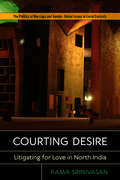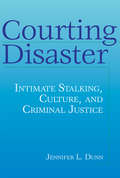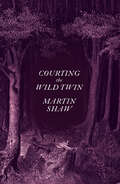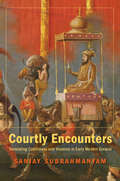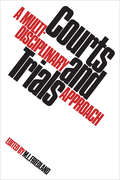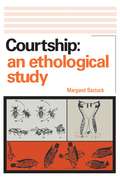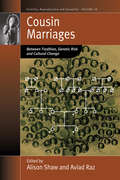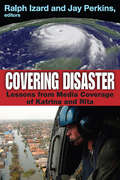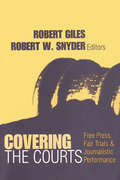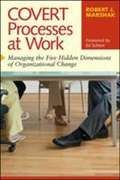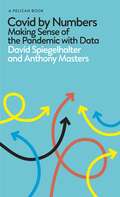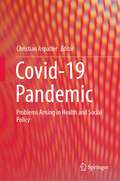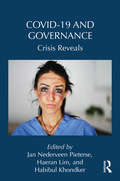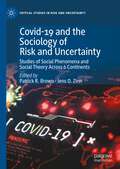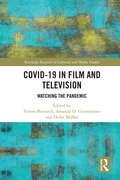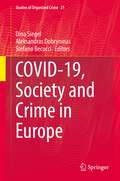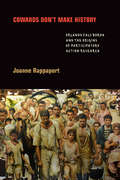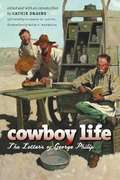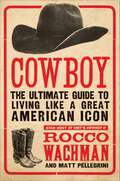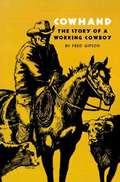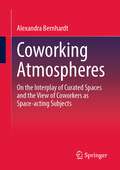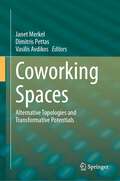- Table View
- List View
Courting Desire: Litigating for Love in North India (Politics of Marriage and Gender: Global Issues in Local Contexts)
by Rama SrinivasanInquiries into marital patterns can serve as an effective lens to analyze social structures and material cultures not only on the question of sexuality, but also on the nature of a private citizen’s engagement with state and law. Through ethnographic research in courtrooms, community,and kinship spaces, the author outlines the transformations in material culture and political economy that have led to renewed negotiations on the institution of marriage in North India, especially in legal spaces. Tracing organically evolving notions of sexual consent and legal subjectivity, Courting Desire underlines how non-normative decisions regarding marriage become possible in a region otherwise known for high instances of honor killings and rigid kinship structures. Aspirations for consensual relationships have led to a tentative attempt to forge relationships that are non-normative but grudgingly approved after state intervention. The book traces this nascent and under-explored trend in the North Indian landscape.
Courting Disaster: Intimate Stalking, Culture and Criminal Justice (Social Problems & Social Issues)
by Jennifer L DunnThis work is a wide-ranging and sensitive examination of the lived experience of intimate stalking victimization. It explores how it feels and what it means to be stalked by a former intimate and how this situation creates dilemmas for victims and their advocates. What is it like to try to become a "victim" in the eyes of the law and then to remain one, when almost anything a woman does to manage the violent emotions of an ex-husband or ex-boyfriend can backfire and discredit her claims? The author draws upon a broad array of rich data, including a survey of college women, courtroom testimony, prosecutors' case files, interviews with victims and observations in a prosecutor's office and a stalking survivor's support group to illustrate the difficulties women face as they work to cope with danger - and to negotiate the hazardous terrain of legal systems - simultaneously. For some victims, Dunn shows, prosecution processes are more traumatic than the events that brought them to seek legal help and her analysis of the historical, cultural and gendered frameworks in which stalking victimization and prosecution takes place accounts for the additional trauma. Definitions of situations and identities are contested rather than given in these arenas where lives and self-concepts rest in the balance. The ways in which we socially construct and confer meaning upon intimate violence and its victims profoundly shape what happens to ordinary women facing extraordinary circumstances. "Courting Disaster" illuminates what we can learn from their experience, whether we are working in these arenas or theorizing about how they do, and sometimes do not, work.
Courting the Wild Twin
by Martin ShawMaster mythologist Martin Shaw uses timeless story-wisdom to examine our broken relationship with the world There is an old legend that says we each have a wild, curious twin that was thrown out the window the night we were born, taking much of our vitality with them. If there was something we were meant to do with our few, brief years on Earth, we can be sure that the wild twin is holding the key. In Courting the Wild Twin, Dr. Martin Shaw invites us to seek out our wild twin––a metaphor for the part of ourselves that we generally shun or ignore to conform to societal norms––to invite them back into our consciousness, for they have something important to tell us. He challenges us to examine our broken relationship with the world, to think boldly, wildly, and in new ways about ourselves—as individuals and as a collective. Through the use of scholarship, storytelling, and personal reflection, Shaw unpacks two ancient European fairy tales that concern the mysterious wild twin. By reading these tales and becoming storytellers ourselves, he suggests we can restore our agency and confront modern challenges with purpose, courage, and creativity. Courting the Wild Twin is a declaration of literary activism and an antidote to the shallow thinking that typifies our age. Shaw asks us to recognize mythology as a secret weapon—a radical, beautiful, heart-shuddering agent of deep, lasting change.
Courtly Encounters: Translating Courtliness And Violence In Early Modern Eurasia (Mary Flexner Lectures Of Bryn Mawr College Ser. #2)
by Sanjay SubrahmanyamIn the sixteenth and seventeenth centuries the court was the crucial site where expanding Eurasian states and empires met and made sense of one another. Richly illustrated, Courtly Encounters provides a fresh cross-cultural perspective on early modern Islam, Counter-Reformation Catholicism, Protestantism, and a newly emergent Hindu sphere.
Courts and Trials: A Multidisciplinary Approach
by Martin L. FriedlandThe judicial system occupies an important place in society, yet it has been one of the least studied of Canadian institutions. Traditionally, examination and criticism of the trial process have been left to lawyers and members of the legal profession. In this volume nine non-lawyers scrutinize its operation in Canada from the perspectives of several academic disciplines. Reginald Allen, a philosopher and classicist, discusses the modern trial process in the light of the trial of Socrates; Anatol Rapoport, a mathematician noted for his work in the fields of game theory and conflict resolution, analyses the adversary system from Charles Hanly, a philosopher and psychoanalyst, uses the Truscott case to explore the psychopathological aspects of a trial from a Freudian viewpoint; one political scientist, Peter Russell, examine the courts' role in the development of the law; another, Donald Smiley, studies their role as protector of civil liberties; James Giffen, a sociologist, points out the inadequacy of the criminal justice system as a means of controlling alcohol and drug addiction; Donald Dewees, an economist, examines court regulation of economic behaviour; and Kenneth McNaught, a historian, discusses the political trial in the Canadian legal system.
Courtship: An Ethological Study
by Margaret BastockThis concise but thorough study of courtship behavior in fish, birds, and arthropods is the first rigorous examination of the evolutionary origins and mechanisms of courtship and its contribution to biological success. Demonstrating the fruitfulness of an empirically based, inductive approach to understanding courtship, the book also explains clearly how principles of modern evolutionary theory can be successfully employed in studying behavior.The author describes many observations and experiments that have not previously appeared outside specialized journals and brings an abundance of simple yet accurate examples of animal behavior to bear on explanations of ethological concepts and evolutionary theory. No attempt is made to skim over the gaps of knowledge apparent in the study of behavior evolution; rather, the author discusses the limitations and difficulties of different approaches, critically reviews the deductions that can be and have been made from them, and tries to present enough evidence on controversial points for the reader himself to judge the validity of specific arguments.Indicating how ethological method, firmly based on biological principles, can intensively investigate and illuminate a single area of animal behavior, the book will be valuable to students and professionals in zoology, animal behavior, and experimental psychology.
Cousin Marriages: Between Tradition, Genetic Risk and Cultural Change (Fertility, Reproduction and Sexuality: Social and Cultural Perspectives #28)
by Alison Shaw Aviad RazJuxtaposing contributions from geneticists and anthropologists, this volume provides a contemporary overview of cousin marriage and what is happening at the interface of public policy, the management of genetic risk and changing cultural practices in the Middle East and in multi-ethnic Europe. It offers a cross-cultural exploration of practices of cousin marriage in the light of new genetic understanding of consanguineous marriage and its possible health risks. Overall, the volume presents a reflective, interdisciplinary analysis of the social and ethical issues raised by both the discourse of risk in cousin marriage, as well as existing and potential interventions to promote “healthy consanguinity” via new genetic technologies.
Covered in Ink: Tattoos, Women and the Politics of the Body (Alternative Criminology #24)
by Beverly Yuen ThompsonA small dolphin on the ankle, a black line on the lower back, a flower on the hip, or a child’s name on the shoulder blade—among the women who make up the twenty percent of all adults in the USA who have tattoos, these are by far the most popular choices. Tattoos like these are cute, small, and can be easily hidden, and they fit right in with society’s preconceived notions about what is ‘gender appropriate’ for women. But what about women who are heavily tattooed? Or women who visibly wear imagery, like skulls, that can be perceived as masculine or ugly when inked on their skin? Drawing on autoethnography, and extensive interviews with heavily tattooed women, Covered in Ink provides insight into the increasingly visible subculture of women with tattoos. Author Beverly Thompson visits tattoos parlors, talking to female tattoo artists and the women they ink, and she attends tattoo conventions and Miss Tattoo pageants where heavily tattooed women congregate to share their mutual love for the art form. Along the way, she brings to life women’s love of ink, their very personal choices of tattoo art, and the meaning tattooing has come to carry in their lives, as well as their struggles with gender norms, employment discrimination, and family rejection. Thompson finds that, despite the stigma and social opposition heavily tattooed women face, many feel empowered by their tattoos and strongly believe they are creating a space for self-expression that also presents a positive body image. A riveting and unique study, Covered in Ink provides important insight into the often unseen world of women and tattooing.
Covering Disaster: Lessons from Media Coverage of Katrina and Rita
by Ralph Izard Jay PerkinsIn 2005, journalists faced enormous challenges while covering hurricanes Katrina and Rita along America's Gulf Coast. They struggled to find ways to communicate, move from one place to another, and find reputable information. They witnessed complete chaos, observed human suffering, and were outraged with delayed or ineffective rescue mechanisms. Not only did journalists face these normal problems of crises, since many themselves were among the victims, they were forced to do their jobs under circumstances that seemed impossible. The contributors to Covering Disaster study personal and professional coping mechanisms and lessons that may be learned from media disaster coverage. During Katrina and Rita, journalists responded largely by redefining traditional ideals of fairness, balance, and objectivity and by adopting an emotionally driven and somewhat more subjective reporting style. In this way, they rediscovered and emphasized journalistic purposes and techniques that have long been the hallmarks of greatness. Their work during those months of destruction and pain was applauded by their readers and viewers because it was useful, critical of officials who were not doing their jobs, sought support for those who were suffering, and took a position of public leadership. Now that the winds have died down, flood waters have receded, and rebuilding has begun, the brand of publicoriented journalism found in the midst of the storms must not be forgotten.
Covering the Courts: Free Press, Fair Trials, and Journalistic Performance (Media Studies)
by Robert GilesCovering the Courts shows how writers and journalists deal with present-day major trials, such as those involving Timothy McVeigh and O.J. Simpson. The volume features such outstanding contributors as Linda Deutsch and Fred Graham, and provides an in-depth look at the performance of the court in an age of heightened participation by reporters, camera operators, social scientists, major moguls of network radio and television, and advocates of special causes.The volume does far more than discuss specific cases. Indeed, it is a major tool in the study of the new relationships between a free press and a fair trial. Interestingly, a consensus is described in which the parties involved in efforts to balance freedom of the press and the right to a fair trial are moving in tandem. In this regard, sensitive issues ranging from the universality of law to the particularity of racial, religious, and gender claims, are explored with great candor.The volume also turns the intellectual discourse to its major players: the members of the press, the lawyers, and the judiciary. Has there been a shift from reporting functions to entertainment values? Does television and live presentation shift the burden from the contents of a case to the photogenic and star quality of players? What excites and intrigues the public: serious disturbances to the peace and mass mayhem, such as the Oklahoma bombings or sexual adventures of entertainment and sports figures? The findings are sometimes disturbing, but the reading is never dull. This book will be of interest to journalists, lawyers, and the interested general public.This volume is the latest in the Transaction Media Studies Series edited by Everette E. Dennis, dean of the school of communication at Fordham University. The volume itself is edited by Robert Giles, the editor, and Robert W. Snyder, the managing editor, of Media Studies Journal. The original contributions were initially presented at The Freedom Forum and its Media Studies Center.
Covert Processes at Work: Managing the Five Hidden Dimensions of Organizational Change
by Robert J. MarshakThe first and only guidebook that specifically outlines methodologies for diagnosing and dealing with all of the "hidden" or covert factors that can subtly sabotage even the most meticulously planned change processes.
Covid By Numbers: Making Sense of the Pandemic with Data (Pelican Books)
by David Spiegelhalter Anthony Masters'I couldn't imagine a better guidebook for making sense of a tragic and momentous time in our lives. Covid by Numbers is comprehensive yet concise, impeccably clear and always humane' Tim HarfordHow many people have died because of COVID-19? Which countries have been hit hardest by the virus? What are the benefits and harms of different vaccines? How does COVID-19 compare to the Spanish flu? How have the lockdown measures affected the economy, mental health and crime?This year we have been bombarded by statistics - seven day rolling averages, rates of infection, excess deaths. Never have numbers been more central to our national conversation, and never has it been more important that we think about them clearly. In the media and in their Observer column, Professor Sir David Spiegelhalter and RSS Statistical Ambassador Anthony Masters have interpreted these statistics, offering a vital public service by giving us the tools we need to make sense of the virus for ourselves and holding the government to account.In Covid by Numbers, they crunch the data on a year like no other, exposing the leading misconceptions about the virus and the vaccine, and answering our essential questions. This timely, concise and approachable book offers a rare depth of insight into one of the greatest upheavals in history, and a trustworthy guide to these most uncertain of times.
Covid-19 Pandemic: Problems Arising in Health and Social Policy
by Christian AspalterThis book presents an overview of social problems and health problems that arose out of, or were flared up by, the global COVID-19 pandemic. It addresses most vital problems in developed and developing countries from literally around the world, by top country experts in their respective fields of study. The book debates first certain overall thematic topics and then analyzes a number of key country case studies. Apart from a set of key theme/problem-based chapters, the country case studies from major-hit countries in the world are yet another highlight of the book. They also feature, in addition to analyzing the pandemic and policy responses per se, one extra special focal point each. The book hence covers the core of most severe social problems, including health problems, that have been spurred or set off by the COVID-19 pandemic. An overall theory chapter that uses a global data analysis and a short theoretical appraisal on the 'human face' of the Pandemic is also offered at the beginning of book, to bring back humanity and human decency (i.e. decency of the human condition) into the scientific debate as well as policy making arena, which is utterly needed at this point of human development.
Covid-19 Responses of Local Communities around the World: Exploring Trust in the Context of Risk and Fear (Routledge Advances in Sociology)
by Khun Eng Kuah, Gilles Guiheux and Francis K. G. LimPresenting a wide range of international case studies, the contributors to this book study the impact of Covid-19 on the risks faced by communities around the globe. Examining cases from the Americas, Europe and Asia – including Mexico, Brazil, China, India, France, and Belgium – Kuah, Guiheux, Lim and their collaborators look at how communities have coped with the social and economic impacts of the pandemic, as well as the public health concerns. Using a framework of risks, fear, and trust, they evaluate how the global health crisis has both revealed and exacerbated a deep crisis of confidence in institutions and systems around the world. In reaction to this they also look at how individuals, social groups and communities have faced fears and built trust at a more local level. The units of spatial analysis in these cases include urban cities, neighbourhoods, slum settlements, migrant camps, schools, markets and homes, for a broad spectrum of case types and rich empirical data. Essential reading for social scientists including sociologists, anthropologists and scholars of other disciplines looking to understand the impact of the Covid-19 pandemic internationally and on a multi-scalar level.
Covid-19 Through the Lens of Mental Health in India: Present Status and Future Directions
by Tilottama MukherjeeThis book provides an in-depth understanding of the impact of COVID-19 on the psychological health of people and communities in India. Focusing on the current discourse on mental health literacy in India, the book also analyses COVID-19-specific health beliefs and their convergences and divergences with COVID-19 protocols and advisories. It discusses the impact of the pandemic on survivors of COVID-19 including their quality of life, psychological well-being, and coping mechanisms while tackling loneliness, loss, and grief. It explores the psychological and social challenges which children have faced during the pandemic and offers techniques to address and adequately manage mental health challenges. Grounded in theoretical and empirical research, this book will be of interest to students, teachers, and researchers of psychology, social psychology, mental health and wellness studies, and sociology. It will also be useful for academicians, social workers, healthcare workers, and psychologists.
Covid-19 and Governance: Crisis Reveals (Routledge Studies in Emerging Societies)
by Jan Nederveen PieterseCovid-19 and Governance focuses on the relationship between governance institutions and approaches to Covid-19 and health outcomes. Bringing together analyses of Covid-19 developments in countries and regions across the world with a wide-angle lens on governance, this volume asks: what works, what hasn’t and isn’t, and why? Organized by region, the book is structured to follow the spread of Covid-19 in the course of 2020, through Asia, the Middle East, Europe, the Americas, and Africa. The analyses explore a number of key themes, including public health systems, government capability, and trust in government—as well as underlying variables of social cohesion and inequality. This volume combines governance, policies, and politics to bring wide international scope and analytical depth to the study of the Covid-19 pandemic. Together the authors represent a diverse and formidable database of experience and understanding. They include sociologists, anthropologists, scholars of development studies and public administration, as well as MD specialists in public health and epidemiology. Engaged and free of jargon, this book speaks to a wide global public—including scholars, students, and policymakers—on a topic that has profound and broad appeal.
Covid-19 and the Sociology of Risk and Uncertainty: Studies of Social Phenomena and Social Theory Across 6 Continents (Critical Studies in Risk and Uncertainty)
by Jens O. Zinn Patrick R. BrownThis book provides a global perspective on COVID-19, taking the heterogenous realities of the pandemic into account. Contributions are rooted in critical social science studies of risk and uncertainty and characterized by theoretical approaches such as cultural theory, risk society theory, governmentality perspectives, and many important insights from ‘southern’ theories.Some of the chapters in the book have a more theoretical-conceptual emphasis, while others are more empirically oriented – but all chapters engage in an insightful dialogue between the theoretical and the empirical, in order to develop a rich, diverse and textured picture of the new challenge the world is facing and responding to. Addressing multiple levels of responses to the coronavirus, as understood in terms of, institutional and governance policies, media communication and interpretation, and the sense-making and actions of individual citizens in their everyday lives, the book brings together a diverse range of studies from across 6 continents. These chapters are connected by a common emphasis on applying critical theoretical approaches which help make sense of, and critique, the responses of states, organisations and individuals to the social phenomena emerging amid the Corona pandemic.
Covid-19 in Film and Television: Watching the Pandemic (Routledge Research in Cultural and Media Studies)
by Verena Bernardi Amanda D. Giammanco Heike MißlerThis collection explores the impact of Covid-19 on the production and consumption of television and film content in the English-speaking world. Offering in-depth analysis of select on-screen entertainment, the volume addresses entertainment’s changing role during and following the Covid-19 pandemic. It also studies the pandemic’s incorporation into the narrative of numerous series, films, and other televised formats, capturing the moments and contexts in which these developments emerged. Chapters examine the pandemic’s impact both on a micro- and macro level, focusing on the content as well as form of TV shows and films. Bringing together an international team of scholars, the book offers a range of perspectives, exploring phenomena such as the ‘YouTubification’ of audience-reliant late-night television, as well as films and TV shows such as Superstore, Grey’s Anatomy, and The Good Fight.Given the pandemic’s lasting impact on the film and television industries, this book will be a valuable read for scholars studying audience and viewer reception of on-screen content, and the impact of crises on cultural industries. It will also appeal to researchers in cultural studies, popular culture studies, television studies, internet studies, film studies, and media studies more broadly.
Covid-19, Society and Crime in Europe (Studies of Organized Crime #21)
by Dina Siegel Aleksandras Dobryninas Stefano BecucciThis volume analyzes the development of the reactions to Covid-19 by governments, the public and the crime patterns in 16 European countries. All countries are members of the European Union and share common European norms and values, but the Covid-19 pandemic can serve as an example of how these norms and values are interpreted differently with regard to people’s trust in public institutions, governmental control strategies, dealing with fear, anxiety and other emotional responses to the new virus, crime patterns and law enforcement priorities to prevent and combat them. The volume provides empirical data based on available statistics, media analysis and qualitative data from interviews and observations, and examines the similarities and differences in crime patterns and the consequences for local communities and law enforcement priorities.
Cowards Don't Make History: Orlando Fals Borda and the Origins of Participatory Action Research
by Joanne RappaportIn the early 1970s, a group of Colombian intellectuals led by the pioneering sociologist Orlando Fals Borda created a research-activist collective called La Rosca de Investigación y Acción Social (Circle of Research and Social Action). Combining sociological and historical research with a firm commitment to grassroots social movements, Fals Borda and his colleagues collaborated with indigenous and peasant organizations throughout Colombia. In Cowards Don't Make History Joanne Rappaport examines the development of participatory action research on the Caribbean coast, highlighting Fals Borda's rejection of traditional positivist research frameworks in favor of sharing his own authority as a researcher with peasant activists. Fals Borda and his colleagues inserted themselves as researcher-activists into the activities of the National Association of Peasant Users, coordinated research priorities with its leaders, studied the history of peasant struggles, and, in collaboration with peasant researchers, prepared accessible materials for an organizational readership, thereby transforming research into a political organizing tool. Rappaport shows how the fundamental concepts of participatory action research as they were framed by Fals Borda continue to be relevant to engaged social scientists and other researchers in Latin America and beyond.
Cowboy Life: The Letters of George Philip
by George Philip Cathie DraineRattlesnakes and ornery horses, the dreaded Texas Itch, midnight rambles in graveyards, trips to Mexico, and hard riding on the last open range: George Philip recounts all these adventures and more with wit and humor. As a young man, George Philip emigrated from Scotland to escape a harsh apprenticeship. In 1899, he arrived on the doorstep of his uncle, James ("Scotty") Philip, patriarch of one of South Dakota's foremost ranching families. For the next four years, Philip rode as a cowboy for his uncle's L-7 cattle outfit during the heyday of the last open range. But the cowboy era was a brief one, and in 1903 Philip turned in his string of horses and hung up his saddle to enter law school in Michigan. With a law degree in hand, he returned to South Dakota to practice in the wide-open western towns of Fort Pierre, Philip, and then Rapid City. In these candid letters, Philip tells his children that his life was an ordinary one, but his memoirs quickly dispel that notion. He provides fascinating insights into the development of the West and of South Dakota. His writing details the cowboy's day-to-day work, from branding and roping to navigating across the plains by stars and buttes as the great open ranges slowly closed up. Philip's tales emphasize the simple pleasures and hard work of cowboy life. "The range country was largely peopled by young boys and young men," he wrote. "They were not arrayed in the spangles so liberally shown in the movies. They slept beneath the stars or the clouds, when they could get to it, and the rest of the time, they were dirty and sweaty and tired." The places and characters of the range find life in Philip's mixture of humor, hard-nosed "horse-sense," and poignant reflection.
Cowboy: The Ultimate Guide to Living Like a Great American Icon
by Matthew A. Pellegrini Rocco WachmanCelebrity host of CMT's Cowboy U Rocco Wachman's modern guide to being a cowboyCowboy: The Ultimate Guide to Living Like a Great American Icon is the first book to explore, through a pop-culture lens, the many facets of the cowboy life. This book entertains and educates with an insider's look at topics such as ranching, rodeos, chuck wagon cooking, cowboy music, country and western dancing, and most important, the cowboy spirit. Cowboy includes instructions, recipes, profiles, photographs, and trivia that vividly depict the day-in, day-out rituals of this iconic lifestyle and show what it meant to be a cowboy in frontier days, and what it means to be a cowboy today!A fresh take on all things cowboy, Cowboy is certain to appeal to the huge fan base of those who love all things Western.
Cowhand: The Story of a Working Cowboy
by Fred GipsonThis is the true story of a West Texas cowhand.
Coworking Atmospheres: On the Interplay of Curated Spaces and the View of Coworkers as Space-acting Subjects
by Alexandra BernhardtThe study by Alexandra Bernhardt deals with coworking spaces and their atmospheres. In addition to a comprehensive consideration of the role of atmospheres, the special significance of community in the context of these work spaces is examined in more detail. Two case studies in urban coworking spaces form the core of the investigation, following a qualitative research design oriented towards ethnography and a plurality of methods. In the context of the analysis, on the one hand, what constitutes coworking in everyday life and thus the new communality at work is considered: relevant practices and rituals, spatial arrangements and atmospheres are elaborated in their composition. On the other hand, coworkers, their spatial actions, and the attitudes associated with them come into closer focus: It is shown how users access coworking spaces as work and community spaces and what role atmospheres play. In addition, social entities are highlighted that are taken up by coworkers in relation to their coworking space and that help shape everyday coworking space life. Tensions that arise from the coexistence of community and service logic are also uncovered, and how they are dealt with is examined in more detail.
Coworking Spaces: Alternative Topologies and Transformative Potentials
by Janet Merkel Dimitris Pettas Vasilis AvdikosThis contributed volume considers the emergence of coworking as centered in labor issues. More specifically, its chapters consider it as a coping mechanism in the worldwide rise of independent modes of work (i.e., self-employment) that leaves more and more workers exposed to precarity as they must organize and manage their own labor. Grounded in this perspective, this volume aims to understand the transformative social and political potentials emerging through coworking as a social and spatial practice. There is a distinct lack of discussion within coworking research on the emancipatory potentials of coworking—and if it is discussed, more cautionary views prevail, highlighting the ambivalence of coworking spaces both as a space of alternative economic practices and as integrated into market economies. The aims of this collection are twofold: First, it aims to make visible the plurality of existing practices around shared resources in coworking and the assemblages of human and non-human actors as agents of change associated with coworking and the re-organization of work and labor power. And second, it aims to develop a more emancipatory narrative for coworking and the role of coworking spaces for workers but also the different spatial contexts in which these spaces are situated. A narrative that does not emphasize entrepreneurship or coworking as the epitome of the ‘neoliberal entrepreneurial self’ as in the dominant interpretations in the current research, but rather one that centers coworking in the creation of meaningful, careful social relationships, supporting empathy and an ethics that recognizes mutual interdependencies and builds a foundation for social change. So, it is about alternative narratives, emancipation politics and the wider social role that coworking spaces might play in neighborhoods, cities or beyond because they are crucial contexts for the formation and maintenance of social relations. With this specific direction, this collection aims to bring coworking research into a fruitful dialog with other research fields-such as sociology of work, feminist perspectives on care, alternative and diverse economies, "post-capitalist" transformation, critical geography, positioning coworking within a range of progressive alternatives in the articulation of economic and social relationships.
